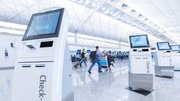News
IP networks converge at Vancouver airport
April 25, 2005
TechWorld: The Vancouver International Airport Authority in British Columbia has just completed a four-year project in which a single IP network was built to support voice, data and video airport communications systems that used to run on 30 networks.
One of the biggest challenges was making the IP conversions in an airport that's closed only three hours a day, said Kevin Molloy, chief information officer and vice president of simplified passenger travel at the authority. "We couldn't shut down for a month for a rollout," he said. The project, estimated to cost about US $4 million, will reduce annual network costs for 22 airlines and Vancouver airport itself by 33 percent, from $7.5 million down to $5 million, he added.
The most recent additions to the airport's IP network were 1,100 IP phones, all installed in January, that are used by ticket agents and airport workers, Molloy said. The phones and the IP backbone are all provided by Cisco Systems, with design services from Vancouver-based Telus Communications.
The converged network has brought together seven airport networks and 23 networks used by airlines, Molloy said. Some of the functions on the new network serve 1,000 closed-circuit security cameras and 1,500 televisions, as well as 60 self-service check-in kiosks inside the airport and another 20 at hotels and convention spots in Vancouver. The wireless baggage-security reconciliation system and the airport's public Wi-Fi hot spots are also on the new backbone, he said.
The airport authority and several airlines created the common kiosks by following an international standard used by several kiosk manufacturers, Molloy said. The kiosks, which are shared by all of the airlines, have helped convince the airlines to give up their networks.
The IP network and the common kiosks support a range of new value-added services, Molloy said. For example, automatic border-patrol services are now available on the kiosks, which are fitted with iris-scanning cameras that a passenger can use to bypass long customs lines once an initial background photo and security check have been logged into the system. Already, 4,000 passengers have signed up for the service.
In addition, the authority has sold its kiosk service to smaller, regional airports that can't afford to build new networks, Molloy said.
Click here to read the full story.












